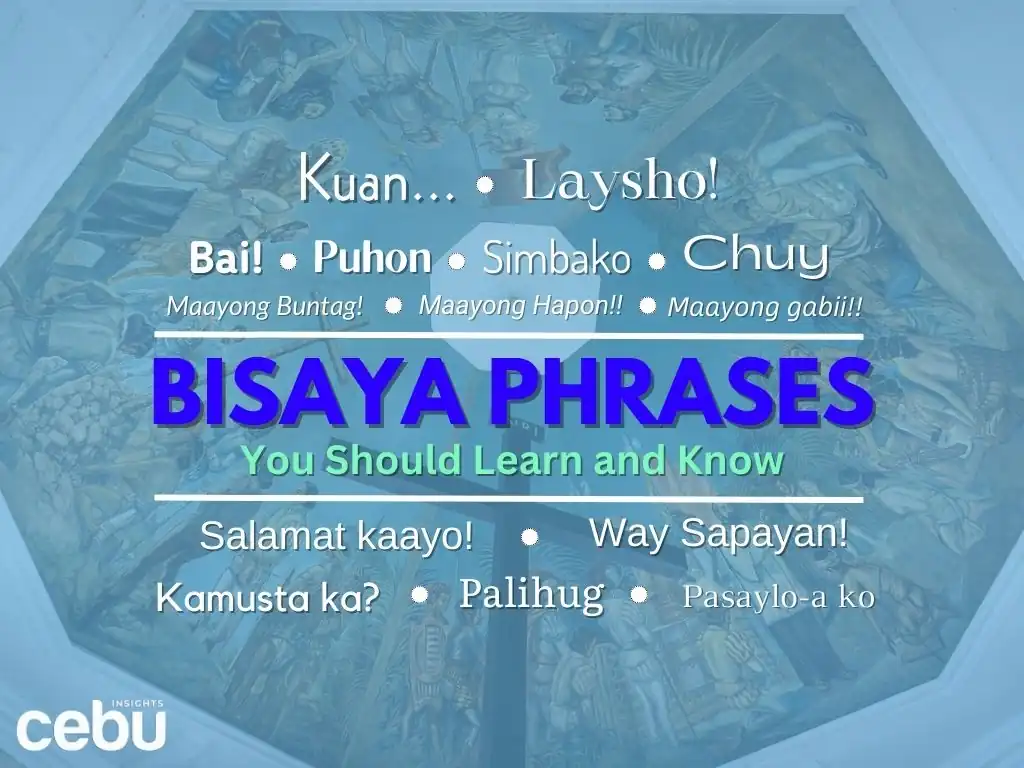There are many Bisaya phrases you can use when traveling to Cebu.
You may have plans to go to Cebu for a trip. A local comes up to you and asks for help. You barely know any Cebuano, what do you do? You may speak to them in English since most Cebuanos understand the English language very well, but there are some that struggle understanding. You may have plans to move here and experience all the wonderful things that the island has to offer. If you want to fit in, barely knowing the local dialect is not enough. You must be familiar with several Bisaya phrases that you might hear Cebuanos say.
Bisaya is the language spoken in islands found in Visayas. Cebu is located in Central Visayas, and it is one of the most popular Bisaya speaking islands in the country. There are many words and common phrases that are used by Cebuanos on a daily basis, and it would definitely help if you knew these words yourself. With enough practice, you can have a full length Bisaya conversation with someone.
Here are some words that you will definitely hear when you witness a conversation between two Cebuanos:
IMPORTANT BISAYA PHRASES
Greetings
- Maayong buntag! – Good morning!
- Maayong hapon! – Good afternoon!
- Maayong gabii! – Good evening!
- Kamusta ka? – How are you?
Courtesies
- Salamat! – Thank you!
- Way sapayan. – You’re welcome
- Palihug. – Please.
- Pasaylo-a ko. – I’m sorry.
Basic Questions
- Unsa imong pangalan? – What’s your name?
- Pila ang plete? – How much is the fare?
- Mao na ba ni nga lugar? – Is this the place?
These words are important to use not only in social situations, but also in public. Phrases like, “Pila ang plete?” and, “Mao na ba ni nga lugar?” are great for commuting. While greetings and courtesies can be used in basically every event, you can also greet your local tour guides when you go to the beaches and restaurants in your itinerary with, “Maayong buntag” or, “Maayong hapon.” They will definitely appreciate your effort in learning the language.
There are many avenues to learn Bisaya language, and studying it until you get used to it will be really helpful. The Filipino language is filled with many variations among other areas in the country, and there are many uncommon Bisaya words that are endemic to the city. You can use these words when speaking to a local to test out your knowledge.
“Bai”
The word “Bai” can be used as a Cebuano way of saying “Bro”. You will mostly hear males say this, but this can be used towards other genders. Friends will use this as an endearment when they meet, especially when they haven’t seen each other for a long time. You can also use this to address a stranger when you want to ask them a question.
Example:
“Kumusta ka, bai?” – “How are you, bro?”
“Puhon”
This is a word that recently has gone viral since netizens were arguing about what it really means. Puhon is a word that you can use as “hopefully” or “in God’s time”. This is a great word that you can use to tell someone when you are hopeful for something to happen. It is a very positive phrase that shows optimism and faith.
Example:
“Mag abot ta puhon.” – “Hopefully, we’ll meet again.”
“Simbako”
“Simbako” is literally translated to “God forbid,” meaning it is the opposite of “Puhon”. Most Cebuanos would knock on a piece of wood whenever they say, “Simbako,” hoping that a certain situation or event will not happen.
Example:
“Simbako unsay mahitabo nimo.” – “God forbid something’s going to happen to you.”
“Chuy”
This is a word you can use to describe something you think is cool or attractive. Some people will even use this as an alternative to “Bai” and call their friends that. There is also the expression “Chuya” to turn the word into a superlative adjective.
Example:
“Chuya ana niya oi!” – “That guy is so cool!”
“Laysho”
This is a term that comes from the English word “social”. Cebuanos use this word to describe something fancy or extravagant. For example, if a friend or someone you know has a fancy new car or the latest model of a gadget, Cebuanos would think that they are “Laysho”.
Example:
“Kalaysho ba ana niya!” – “He is very fancy!”
“Kuan”
They say that the Cebuano language is very unique since it has a word that they use as a form of speech. “Kuan” doesn’t really have a meaning, but you can say it in case you don’t know the word you are looking for. Sometimes there are Cebuanos that have a full sentence where this word comes up at the start, middle, or end. Try it out when you forget the names of the places you go to in Cebu.
Example:
“Si kuan ba, nagkuan sa kuan.” – “What’s-his-name was doing something, somewhere.”
There are many more words that you can use when you go to Cebu to use on the locals. There are also many funny Bisaya words and formal Bisaya phrases that you can use during Cebuano small talk. Learning these words and phrases is one of the first steps in knowing how to travel in Cebu.
Most of these Bisaya phrases show the culture of the Cebuanos and their everyday lives. Some words are funny, some are hopeful, and some are sad. Learning these words for your everyday life in Cebu would be good as you can fit in with the many locals on the island. Practice some more and you will be one of the best Bisaya speakers, puhon.






